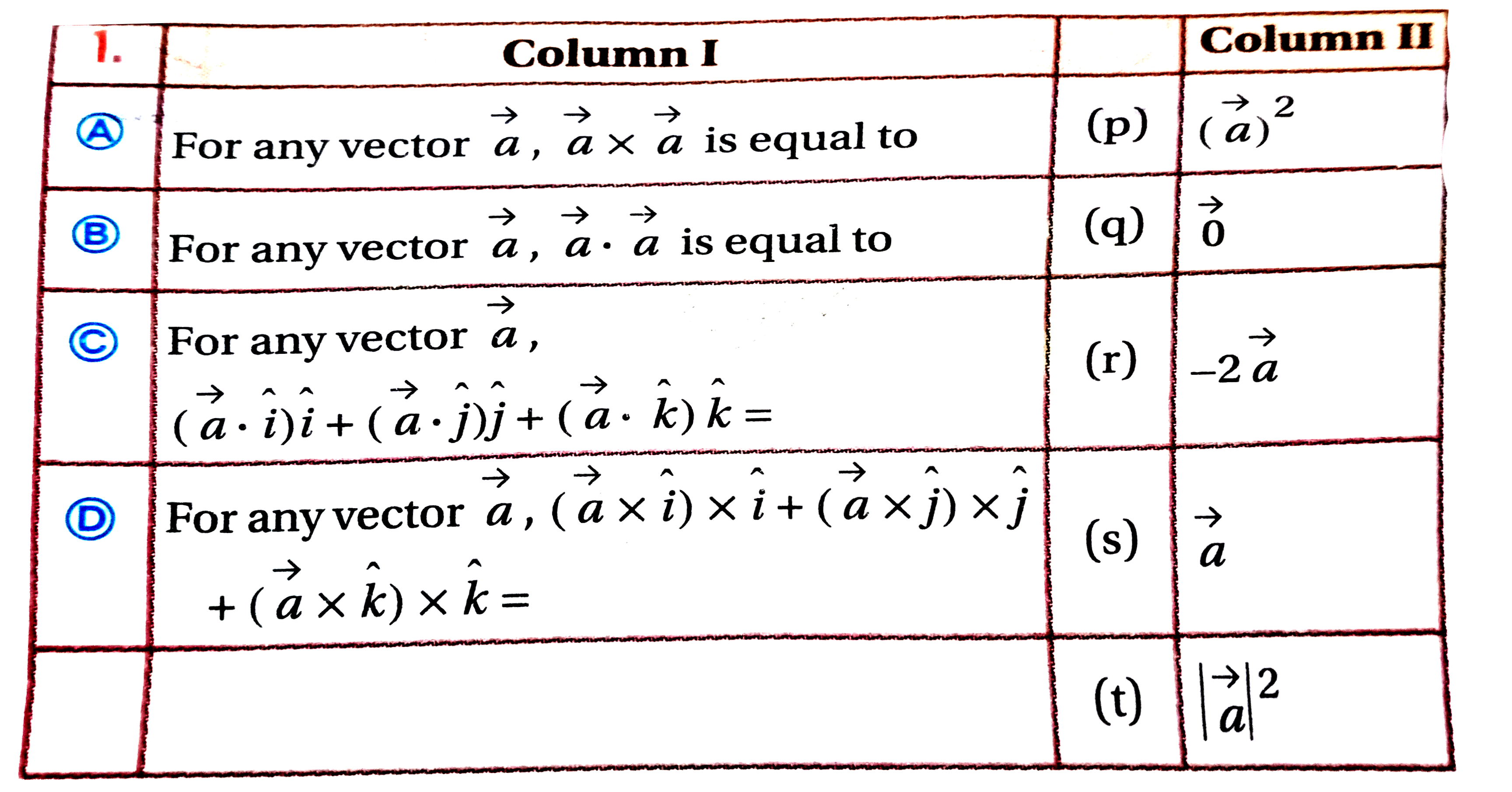If →a,→b,→c are any vectors, then which the following is equal to →a×→b+→b×→c+→c×→a ?Solution in Bengali
(→a−→b)×(→b−→c)
(→c−→b)×(→a−→c)
(→a−→b)×(→a−→c)
12{→a×(→b−→c)+→b×(→c−→a)+→c×(→a−→b)}
The correct Answer is:A,B,C,D
Step by step video, text & image solution for If vec(a), vec(b),vec(c ) are any vectors, then which the following is equal to vec(a) xx vec(b) +vec(b)xx vec(c ) + vec(c ) xx vec(a) ? by Maths experts to help you in doubts & scoring excellent marks in Class 12 exams.
Updated on:21/07/2023Topper's Solved these Questions
- PRODUCTS OF TWO VECTORSBOOK - CHHAYA PUBLICATIONCHAPTER - PRODUCTS OF TWO VECTORSEXERCISE - Sample Questions for Competitive Examination (Integar Answer Type )
5 Videos
- PRODUCTS OF TWO VECTORSBOOK - CHHAYA PUBLICATIONCHAPTER - PRODUCTS OF TWO VECTORSEXERCISE - Sample Questions for Competitive Examination (Matrix Match Type )
2 Videos
- PRODUCTS OF TWO VECTORSBOOK - CHHAYA PUBLICATIONCHAPTER - PRODUCTS OF TWO VECTORSEXERCISE - Exercise 2B ( Short answer type questions)
20 Videos
- PROBABILITYBOOK - CHHAYA PUBLICATIONCHAPTER - PROBABILITYEXERCISE - SAMPLE QUESTIONS FOR COMPETITIVE EXAMS
18 Videos
- PROPERTIES OF TRIANGLE BOOK - CHHAYA PUBLICATIONCHAPTER - PROPERTIES OF TRIANGLE EXERCISE - Assertion- Reason Type:
2 Videos
Similar Questions
Let →a=−ˆi−ˆk,→b=−ˆi+ˆjand→c=ˆi+2ˆj+3ˆk be three given vectors . If →r is a vector such that →r×→b=→c×→band→r.→a=0 then the value of →r.→b is -
View SolutionMatch the following Column I and Column II

View SolutionIf →a=ˆi+ˆj,→b=ˆi−ˆj and →c=5ˆi+2ˆj+3ˆk , find the value of [→b→c→a]
View SolutionIf A and B are two independent events of a random experiment and P(A)=12/,P(B)=15, then -
View SolutionStatement-I: In △ABC,sinA+sinB>sinC
Statement-II: In △ABC, sum of two sides is always greater than the third side.
View SolutionFor any three vectors a b,c,show that vec a xx(vec b+vec c)+vec b xx(vec c+vec a)+vec c xx(vec a+vec b)=0
View SolutionIf vec a, vec b, vec c are three vectors such that | vec b | = | vec c | then {(vec a + vec b) xx (vec a + vec c)} xx {(vec b xxvec c)} * (vec b + vec c) =
View SolutionFor any three vectors vec a, vec b, vec c, (vec a-vec b) * (vec b-vec c) xx (vec c-vec a) is equal to
View SolutionIf →a,→b and →c are mutually perpendicular unit vectors and →a×→b=→c, show that →b=→c×→a and →a=→b×→c.
View SolutionIf →a.→b×→c≠0 and →a'=→b×→c→a.→b×→c,→b'=→c×→a→a.→b×→c,→c'=→a×→b→a.→b×→c, show that :
→a'.(→b'×→c')=1→a.(→b×→c)
View SolutionFor any three vectors →a,→b,→c , show that →a×(→b+→c)+→b×(→c+→a)+→c×(→a+→b)=0
View SolutionIf →a, →b, →c are three vectors such that →a.→b=→a. →c and →a × →b=→a × →c, →a ≠0 , then show that →b=→c .
View SolutionIf →A,→Band→C are vectors such that ∣∣→B∣∣−∣∣→C∣∣. Prove that [(→A+→B)×(→A+→C)]×(→B+→C).(→B+→C)=0
View Solutionयदि →a,=→b×→c[→a→b→c]'→b'=→c×→a[→a→b→c]'→c'=→a×→b[→a→b→c] है, तब प्रदर्शित कीजिए कि →a×→a'+→b×→b'+→c×→c'=0 होगा, जहाँ →a,→b,→c असमतलीय सदिश है |
View SolutionIf →a×→b=→c×→dand→a×→c=→b×→d then show that →a−→dand→b−→c are parallel vectors.
View Solution
